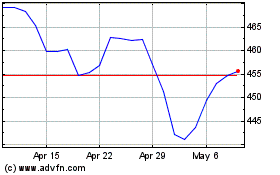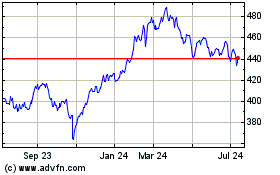Higher Spending Benefits Mastercard -- WSJ
May 03 2018 - 3:02AM
Dow Jones News
By AnnaMaria Andriotis and Imani Moise
This article is being republished as part of our daily
reproduction of WSJ.com articles that also appeared in the U.S.
print edition of The Wall Street Journal (May 3, 2018).
Mastercard Inc. reported higher-than-expected profit and revenue
for the first quarter due to increased consumer spending and
confidence.
The company, which is the second-largest U.S. card network,
increased guidance for its 2018 revenue, a sign that it believes
the healthy economic environment will continue. It also increased a
key expense growth projection as the company accelerates
investments in several areas, including security.
Mastercard reported a profit of $1.49 billion, or $1.41 a share,
up from $1.08 billion, or $1 a share, a year earlier. On an
adjusted basis, earnings rose 49% to $1.50 a share from a year
earlier. Analysts surveyed by Thomson Reuters had expected
$1.25.
Shares climbed 3.5% to $186.80 in morning trading, higher than
the record closing price of $183.24 set in March. The stock has
gained 22.5% so far this year while the S&P 500 has inched 0.8%
lower.
Gross dollar volume, or the total value of all transactions on
credit, debit and prepaid cards processed by the company, rose 14%
to $1.4 trillion.
The payment giant said revenue jumped 31% to $3.58 billion,
topping the $3.25 billion forecast by analysts. The company's
top-line was helped by acquisitions and an increase in cardholders
using their cards outside of the country they are issued in.
Cross-border volume fee revenue increased 26% from a year prior.
The company also increased its organic net revenue growth guidance
to mid-teens percent growth for the year, up slightly from the
previous guidance.
The company is benefiting from a strong credit-card market as
consumers shift more of their spending to cards. Most large U.S.
banks that issue credit cards reported increases in credit-card
purchase volume in the first quarter.
Mastercard's finance chief, Martina Hund-Mejean, said on the
earnings call that cross-border volumes in April, through April 28,
grew 19% globally. That was down from the 21% cross-border volume
growth in the first quarter, in part due to the drop-off of issuers
allowing cryptocurrency wallet funding. Large U.S. issuers,
including Citigroup Inc, Bank of America Corp., and Capital One
Financial Corp., said during the first quarter that they would no
longer allow consumers to buy bitcoin with their credit cards.
Mastercard's operating expenses totaled $1.64 billion, up 35%
from a year prior, excluding special items relating to litigation
provisions. General and administrative expenses, which make up the
majority of the company's expenses, increased 36%. Advertising and
marketing expenses rose 32% to $224 million. Mastercard also
increased its organic expense growth guidance to high-single digit
percent growth from mid-single digits previously.
Following the earnings call, Mastercard said in a regulatory
filing that it took a $19 million charge in the first quarter
relating to settlements with U.K. merchants and a $70 million
charge resulting from settlements with more than 70 European
claimants.
Merchants "have filed or threatened litigation with respect to
interchange rates in Europe for purported damages exceeding $1
billion," the company said. Interchange fees are set by card
networks, including Mastercard, and paid by merchants to the banks
that issue cards when consumers shop with them. Merchants in the
U.S. and abroad have long argued that these fees, in particular
with credit cards, are too high.
Regarding its efforts to expand in China, Mastercard CEO Ajay
Banga said the company applied for a domestic license with a joint
venture and that it is waiting for clarity from the Chinese
government. The Wall Street Journal reported in April that
Mastercard had formed a partnership with three Chinese entities,
had applied with the central bank to conduct card-clearing and
settlement transactions in the country, and that its joint-venture
application hadn't yet been accepted by the People's Bank of
China.
Separately, Mr. Banga discussed his support for a move to a
single-pay button at online checkout. Visa and Mastercard said in
April they are planning a move toward a shared pay button on which
consumers can save their payment credentials. This would replace
the individual pay buttons that card networks have rolled out in
recent years.
Write to AnnaMaria Andriotis at annamaria.andriotis@wsj.com and
Imani Moise at imani.moise@wsj.com
(END) Dow Jones Newswires
May 03, 2018 02:47 ET (06:47 GMT)
Copyright (c) 2018 Dow Jones & Company, Inc.
MasterCard (NYSE:MA)
Historical Stock Chart
From Mar 2024 to Apr 2024

MasterCard (NYSE:MA)
Historical Stock Chart
From Apr 2023 to Apr 2024
